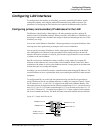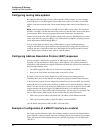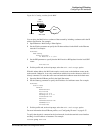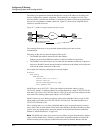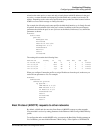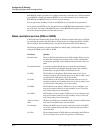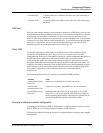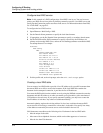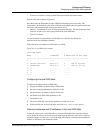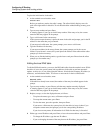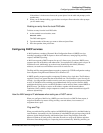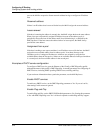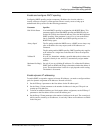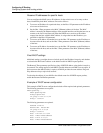
Configuring IP Routing
Configuring system-level routing policies
MAX 6000/3000 Network Configuration Guide 9-15
DNS lists
DNS can return multiple addresses for a hostname in response to a DNS query, but it does not
include information about availability of those hosts. Users typically attempt to access the first
address in the list. If that host is unavailable, the user must try the next host, and so forth.
However, if the access attempt occurs automatically as part of immediate services, the physical
connection is torn down when the initial connection fails. To avoid tearing down physical links
when a host is unavailable, you can set the List Attempt parameter to Yes. The List Size
parameter specifies the maximum number of hosts listed (up to 35).
Client DNS
Client DNS configurations define DNS server addresses that will be presented to WAN
connections during IPCP negotiation. They provide a way to protect your local DNS
information from WAN users. Client DNS has two levels: a global configuration that applies to
all PPP connections (defined in the Mod Config profile), and a connection-specific
configuration that applies only to the WAN connection (defined in the Connection profile).
The global client addresses are used only if none are specified in the Connection profile. You
establish Client DNS by setting the Client Pri DNS and Client Sec DNS parameters to specify
the IP addresses of the primary and secondary DNS servers in either the Mod Config profile
(for a global configuration) or in a Connection profile (for a connection-specific
configuration).
The following attribute-value pairs configure client DNS in RADIUS profiles:
Example of address resolution configuration
Configuring the MAX unit for DNS or WINS address resolution enables the unit to use local
DNS or WINS servers to translate between hostnames and IP addresses.
The following examples illustrate procedures for configuring address resolution and managing
the DNS table.
Client Pri DNS A primary DNS server address to be sent to any client connecting to
the MAX.
Client Sec DNS A secondary DNS server address to be sent to any client connecting to
the MAX.
Attribute Value
Ascend-Client-Primary-
DNS (135)
Address of a client DNS server for the connection.
Ascend-Client-
Secondary-DNS (136)
Address of a secondary client DNS server for the connection.
Ascend-Client-Assign-
DNS (137)
Enables/disables client DNS for the connection. If set to DNS-
Assign-Yes (1), the system presents client DNS server addresses
while negotiating the connection. The addresses it presents may be
specified in the RADIUS profile or IP-Global profile.



